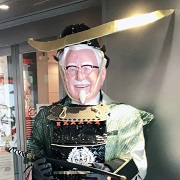|
ErIog posted:The theory that I've heard commonly around here is that those Japanese political movements in the 60's felt they lost the moral high ground and support from the public by engaging in more violent rhetoric and methods. They use absurdly cutesy imagery now, sometimes to the point of dissonance with the subject matter involved, so that their movement is not perceived to be violent or extreme. ReidRansom posted:I remembered the book. It was The Image Factory by Donald Ritchie. A good read, as indicated by this 1-star Amazon review:
|
|
|
|

|
| # ? May 13, 2024 12:17 |
|
Yeah, I'd be super interested in any recommendations on good texts that cover post-war political movements in Japan too.
|
|
|
|
Ernie Muppari posted:Yeah, I'd be super interested in any recommendations on good texts that cover post-war political movements in Japan too. Yakuza: Japan's Criminal Underworld by David Kaplan covers the emergence of the extreme-right wing groups and their connection to the old guard that got away from being charged with war crimes and how instrumental the yakuza were in supporting them. Basically a couple of extremely wealthy old men who were ardent defenders of Imperial Japan switched sides immediately when the US arrived and promised to keep out communism, then proceeded to funnel tens of millions in organized crime and right wing movements to help them get established and secure. When Kaplan finished the book he was expecting it to be published in Japan, but he and his American publisher got a phone call that said more or less "We can't publish this in Japan, these people (the ones he identifies as yakuza and yakuza supporters) would shut us down" It's been a few years since I read the book, but I remember more about the complex web of money/ties between billionaire corrupt as gently caress business tycoons, corrupt as gently caress politicians, the Yakuza, and how quickly the right wing groups reemerged about a decade after being 'banned' by the US then any of of stuff about how the Yakuza operates or does business.
|
|
|
|
These two videos talk about the connection between Japanese right wing politics and hip hop. Very interesting.
|
|
|
|
pentyne posted:It's been a few years since I read the book, but I remember more about the complex web of money/ties between billionaire corrupt as gently caress business tycoons, corrupt as gently caress politicians, the Yakuza, and how quickly the right wing groups reemerged about a decade after being 'banned' by the US then any of of stuff about how the Yakuza operates or does business. Some of those guys like Yoshio Kodama were also funded by the CIA. It's interesting that after the Korean War and the rise of the Iron Curtain in Europe that the US did an about face in Japan and Germany. Defeating communism was such a priority that they would help the people they spent the last 5 years trying to stop back into power. The US government and the American people can't commit to any policy or initiative that requires more than 10 years to finish. Almost the exact same thing happened during Reconstruction after the US Civil War because the US government and American people stopped caring. RocknRollaAyatollah fucked around with this message at 01:20 on Sep 3, 2014 |
|
|
|
RocknRollaAyatollah posted:Some of those guys like Yoshio Kodama were also funded by the CIA. What went on in Japan was almost comical, because when Germany was taken the Soviets had already taken hold of the Eastern part of the country the war turned into "get the scientists before the Soviets do" and set the boundary for the Cold War in Europe. Obviously a land invasion of Japan would depend heavily on Soviet involvement and so the USSR would get to demand concessions, but a wholly US occupation gave wealthy Imperial Japanese supporters a chance to approach the US and offer their support, connections, money, and infrastructure to aid the US military and the new civil government. It's amazing it turned out as well as it has, the US and CIA backed the exact same people who pushed Japan into its Imperial ambitions and all that came out of it was a one party system and various economic malaise. The closest analogy I could think of would be the highest ranking civilian/business members of the Nazi party being given a free pass and put in charge of the rebuilding with full US support.
|
|
|
|
pentyne posted:What went on in Japan was almost comical, because when Germany was taken the Soviets had already taken hold of the Eastern part of the country the war turned into "get the scientists before the Soviets do" and set the boundary for the Cold War in Europe. Obviously a land invasion of Japan would depend heavily on Soviet involvement and so the USSR would get to demand concessions, but a wholly US occupation gave wealthy Imperial Japanese supporters a chance to approach the US and offer their support, connections, money, and infrastructure to aid the US military and the new civil government. It's amazing it turned out as well as it has, the US and CIA backed the exact same people who pushed Japan into its Imperial ambitions and all that came out of it was a one party system and various economic malaise. The US didn't even get the weapons scientists like they did in Europe because they were all in Manchuria and Korea. The Soviets got Unit 731, took all of Unit 731's research, and then jump started the Soviet biological warfare program. To add insult to injury the US in turn paid to clean up those facilities in the 90's after the USSR collapsed. The Soviets also accomplished one of Russia's great foreign policy goals since the 19th century by taking Sakhalin and the Kurile Islands. The US did get an indefinite lease on an unsinkable aircraft carrier so I guess they have that going for them.
|
|
|
|
computer parts posted:You can also have sexist attitudes without that particular one, though. I guess you could but there's a reason they go together. If a woman's purpose is to marry and procreate and take care of a family what's the point of having her not marry ASAP once she's of marriageable age?
|
|
|
|
RocknRollaAyatollah posted:The US didn't even get the weapons scientists like they did in Europe because they were all in Manchuria and Korea. The Soviets got Unit 731, took all of Unit 731's research, and then jump started the Soviet biological warfare program. To add insult to injury the US in turn paid to clean up those facilities in the 90's after the USSR collapsed.
|
|
|
|
Wittgen posted:These two videos talk about the connection between Japanese right wing politics and hip hop. Very interesting. Those lyrics 
|
|
|
|
Wittgen posted:These two videos talk about the connection between Japanese right wing politics and hip hop. Very interesting. This was super hella interesting.
|
|
|
|
If anybody else here is interested in the study of cuteness/kawaii: I read Donald Richie's The Image Factory yesterday and found it a bit lacking. The essay on cuteness is only 10 pages long and consists mostly of the description of examples of cuteness in Japanese society and less on their analysis. However, there was an interesting quote from Brian MacVeigh (apparently from Wearing ideology : state, schooling and self-presentation in Japan, which I will check out next) stating that cuteness 'communicates power relations and power plays, effectively combining weakness and humility with influence domination and control'. The first attributes seem obvious (and I would add that cuteness oftentimes also expresses conformity) but the second part is where it becomes interesting for me. Unfortunately Richie doesn't give further explanation at this point. The other essays have similar problems. The phenomena he describes are all interesting but it feels a bit like a cabinet of curiosities since analysis is lacking (the best part is the essay on pachinko as far as I'm concerned). He often uses the Japanese national character to explain certain things and while I'm not completely opposed to this explanation in general, I think he stretches it too far. At times it becomes almost comical, for example if he explains why especially the Japanese have no qualms with talking loudly on their phone in public (an attitude that as far as I can tell must have changed dramatically since the book was written, I assume for very Japanese reasons as well). Another example would be the afterword. I do understand that this is more of a general outlook that is less restricted than the essays but still, going full Whorf is a bit much. Either I missed some joke or he really tries to explain the Japanese character with the fact that the Japanese language has no future and thus, he concludes, 'the Japanese have no intention that must be expressed in such a tense'. [Edit]: Also thanks for this video on hiphop, very interesting and a bit disheartening. true.spoon fucked around with this message at 12:28 on Sep 7, 2014 |
|
|
|
true.spoon posted:However, there was an interesting quote from Brian MacVeigh (apparently from Wearing ideology : state, schooling and self-presentation in Japan, which I will check out next) stating that cuteness 'communicates power relations and power plays, effectively combining weakness and humility with influence domination and control'. I've not read it either, but I would assume he's talking about entities whose power is obvious to all Japanese people using kawaii for mass communication. Eg. garbage trucks with pastel blue baby elephants painted on them.
|
|
|
|
Ernie Muppari posted:Yeah, I'd be super interested in any recommendations on good texts that cover post-war political movements in Japan too. Junnosuke Masumi, “The 1955 System in Japan and Its Subsequent Development,” Asian Survey, Vol. 28, No. 3 (Mar., 1988)
|
|
|
|
Samurai Sanders posted:I dunno if its so much "lol gently caress you" but rather you come in to their office or whatever and even though you're asking, in Japanese, for the same things a Japanese person would, they get all weird and have to think about everything five times through. Understanding LDP hegemony for many years is always a matter of debate. Its a joke in the realms of International Relations that Authoritarian regimes are jealous of the success of the LDP. Pinpointing exactly what made the party so powerful and contributed to its long term dominance one would have to first look at the historical context. That of postwar Japan. This was a country whose physical capital had all but been destroyed, whose food production thanks to blockages of trade was at an all time low. However, this was also former one of the most advanced nations in the world rivaling western nations. Japan had the technical know how of industrialized nations what it didn't have was the physical capital thanks to bombings and the war. the areas of manufacturing and construction were the obvious targets in the postwar era. So what became of key importance to a redeveloping Japan was getting the physical capital back ie: it was necessary to get holdings of foreign currencies to import the machines needed to rebuild capital. So Japan had a well educated workforce available as well as a great need for capital investment. If you know something about economics you know these are both considered inputs to an economy and eventually result in diminishing returns unless technology or efficiency increases but that discussion is for another time. Basically Japan had an input led growth mainly around key industries like construction, manufacturing, ect. What does this have to do with the LDP? Everything. in order to import the capital needed you must have holdings of the foreign currency (this is macroeconomics stuff) and the ministries namely MITI(Ministry of International Trade and Industry) were the only way to get hold of these foreign currencies, in this case dollars. Thus development was heavily vested with the state. As OP points out the LDP had support from the US gov. namely in that the US govt. had key interests in keeping Japan out of communist hands and so naturally the right leaning parties had more of the US support. However, I think that the LDP really gained all its power is because its a mass party, not one of ideology. It co opts interests of possible contenders by taking on their issues and for lack of a better description throws money at it. The LDP basically was run through pork barrel politics, the govt. would get MITI to create infrastructure jobs to companies which support the LDP representatives. These projects would of course be built in the diet members home districts and thus diet members re-election was namely due to the ability to deliver the pork. But why the LDP? well one must understand the Japanese electoral system. Multi Member District with votes for a single candidate. This means that several people go to the diet to represent a district lets say 4 as an arbitrary number. However, voters can only vote for one candidate (not Party). See usually MMD is good for multiparty systems. However, in Japan you vote for one candidate, this means in our 4 member district the top 4 vote getter get a diet seat. This is key because most parties run 1 candidate but the LDP runs several. Even though there are several of the same party members the LDP will likely take most of the seats because a) its not a party of ideology and b) you want to vote for someone who will deliver something for you. Often electing someone from the socialists isn't a good idea for you even if you are ideologically one. the socialists can't get a majority of seats because they only run 1 candidate in each district (not even all of them mind you) so the LDP which can get a majority because it runs several members is able to tell MITI how to make policy which benefits their constituents and keeps them in office. This is a brief description it goes deeper than this but character limit. But, when ideological issues threaten the LDP as a rival party they adopt them aka agriculture and the green movement. I can go into more details if necessary but lets just say it involves the government paying for things. what needs to also be said is the LDP connection to the local leadership, because the local leadership is supported financially by the LDP and by the jobs it provides and so the local leadership can go out and get them support which other parties fail to do. This isn't even mentioning malapportionment.
|
|
|
|
Lack of paragraphs and odd formatting/punctuation aside, that was a good post.
|
|
|
|
I agree, but what did it have to do with that six month old post of mine?
|
|
|
|
Samurai Sanders posted:I agree, but what did it have to do with that six month old post of mine? Nothing the thread just was dead, and I wanted to start it up again. Also I think he hellps people who just joined see some background. Sirreal fucked around with this message at 04:18 on Sep 30, 2014 |
|
|
|
Sirreal posted:Nothing the thread just was dead, and I wanted to start it up again. Also I think he hellps people who just joined see some background. It ties in well with the present discussion in the Chinese Economics thread.
|
|
|
|
Sirreal posted:words Good post. Almost a perfect low-punctuation summary of the Introduction to Modern Japanese Studies course I took at the University of Washington 
|
|
|
|
Surprised this hasn't been brought up yet.quote:Japan’s government is weathering accusations of links to far-right groups that promote racism and hate speech.
|
|
|
|
Mr. Fix It posted:Good post. Almost a perfect low-punctuation summary of the Introduction to Modern Japanese Studies course I took at the University of Washington With Pekkanen? High-five, fellow Husky. Re: neo-nazis, there is culpable deniability in my opinion but still pretty smoking-gunlike. Abe mostly appointed yes-men, the right wing sauce is just icing on top I'd say.
|
|
|
|
I like how obvious the Japanese right wing's neurosis about not being white is with the constant aping of Nazi Germany.
|
|
|
|
The ubiquity of far-right shitheads among the moneymen and kingmakers muddies the waters somewhat, I feel. I'd imagine it's pretty hard to find a Japanese politician over say 35 or so who hasn't appeared in a photograph with someone who has awful political views at some point in their career. Anyway, the influence of far-right weirdos is hardly news to anyone even vaguely paying attention.
|
|
|
|
Hey Japan thread what's the state of Shinto right now?
|
|
|
|
Forums Terrorist posted:I like how obvious the Japanese right wing's neurosis about not being white is with the constant aping of Nazi Germany. It's not neuroses about not being white. The thing that was special about the Nazi ideology was how extreme and completely nuts it was. The idea that white people were awesome wasn't actually that special back then because that's what most white people would say if you asked them. Proclaiming your own people are the peak example of the human race was very common up until quite recently for most of the world. So this comparison you're making is a bit too reductive. Nihon-jinron and other ethnic supremacy viewpoints most definitely predate Hitler's ideology. The Japanese people, even during WW2, also didn't really buy into the entire Nazi mythos. The Japanese mostly used WW2 as an opportunity to do things they already wanted to do that had nothing to do with anything Hitler was doing. The deepest they went was being handed a translation of The Protocols of the Elders of Zion and being suspicious of Jewish people who weren't really perceived as a threat since the people in power in Japan were fairly certain their weren't any Jews there. So it was mostly a, "sure, I guess, why not" kind of thing that I'm sure some believed, but lots of others were just probably okay with agreeing with it in order to ally themselves with the Axis powers to further their own goals. Lawman 0 posted:Hey Japan thread what's the state of Shinto right now? It's mostly become a cultural artifact rather than a religious one. It's very similar to how many secular people celebrate Easter or Christmas. It's also very similar to people tossing coins into fountains for good luck or different things in many western societies. Shinto is a polytheistic point of view, and so Japanese people are typically of the belief that, "the more the merrier" when it comes to deities and blessings. There's a handful of people who would say they're devout believers in it, and the rest of the population is more of the "it couldn't hurt to go to a shrine for good luck after the new year," style of thinking. ErIog fucked around with this message at 12:41 on Sep 30, 2014 |
|
|
|
Reverend Cheddar posted:With Pekkanen? High-five, fellow Husky. Yeppers. I think the main reason I find Japanese politics enthralling is Pekkanen and that class. My only complaint is that he made us by his wife's book which really wasn't suited to an intro course
|
|
|
ErIog posted:The Japanese people, even during WW2, also didn't really buy into the entire Nazi mythos. The Japanese mostly used WW2 as an opportunity to do things they already wanted to do that had nothing to do with anything Hitler was doing. The deepest they went was being handed a translation of The Protocols of the Elders of Zion and being suspicious of Jewish people who weren't really perceived as a threat since the people in power in Japan were fairly certain their weren't any Jews there. So it was mostly a, "sure, I guess, why not" kind of thing that I'm sure some believed, but lots of others were just probably okay with agreeing with it in order to ally themselves with the Axis powers to further their own goals.
|
|
|
|
|
Hirohito's 12,000 page biography came out and surprise to no one it really tried to whitewash his WW2 role. http://www.nytimes.com/2014/09/30/opinion/hirohito-string-puller-not-puppet.html quote:CAMBRIDGE, Mass. — LAST month, I received a startling email from an employee at one of Japan’s largest newspapers, about a development I’d long awaited. The government was about to unveil a 12,000-page, 61-volume official biography of Emperor Hirohito, which a large team of scholars and civil servants had been preparing since 1990, the year after his death.
|
|
|
|
What's the point of writing a biography if you don't touch on the central and defining moments and issues of a persons life? Like white wash it or justify it in an active way at least, how can you write 12,000 pages of simply avoiding the issue?
|
|
|
|
GhostofJohnMuir posted:What's the point of writing a biography if you don't touch on the central and defining moments and issues of a persons life? Like white wash it or justify it in an active way at least, how can you write 12,000 pages of simply avoiding the issue? To paint him as a great man, drum up nationalism, and wholly ignore the terrible acts Japan committed during WW2?
|
|
|
|
Yeah, I didn't know which way that biography was going to end up going, but I guess it was silly of me to think it could have gone the other way.
|
|
|
|
Samurai Sanders posted:Yeah, I didn't know which way that biography was going to end up going, but I guess it was silly of me to think it could have gone the other way. The whole article goes into greater detail, that the biography is a great place for lots of specific information on Hirohito's life and rule, specific dates, meetings, and reveals previous primary sources never studied, but as a whole it comes off as a product of the current political climate and culture, and any serious historian will find it seriously lacking in certain aspects at best and whitewashing at worst. If the primary sources are opened up the the public it'll certainly become a major focus of study by those who have no problem delving into Japan's embarrassing history but until then this biography is a borderline curiosity that ignores any remotely controversial subject.
|
|
|
|
pentyne posted:If the primary sources are opened up I guarantee Kunaicho will never release those primary sources unless they're stolen by freaking Lupin III. Reverend Cheddar fucked around with this message at 13:29 on Jun 18, 2020 |
|
|
|
Reading about the Kunaicho, I'm wondering what exactly stops the imperial family to just say "Yeah, we're just going to do whatever the gently caress we want with or without your permission. We're the loving imperial family."? According to the Wikipedia page, it seems like they at least try to control every aspect of the imperial family's lives.
|
|
|
|
Wow. I just read the Kunai-cho's Wiki too, and came across this:quote:The Agency has been portrayed as controlling every aspect of the lives of the members of the Imperial Family, both public and private, and exerting near-total control over them, from staff appointments to wardrobe selection. As with the imperial family itself, positions in the 1300-year-old Agency are hereditary. Nine out of ten requests from the imperial family, even the Emperor himself, are rejected. Masako, for instance, was denied browsing a bookstore, visiting her family, or calling her old college friends around the world or even going out for a cup of coffee. They certainly seem like a delightful organisation. Considering that the Hirohito book has been in the works for 24 years, I think we can lay the blame for its blandness squarely on the Kunai-cho, rather than on the current administration specifically. Edit: Went to the Japanese Wiki page on the Kunai-cho, and it's shorter than the English one and contains no criticism. ozza fucked around with this message at 14:08 on Oct 2, 2014 |
|
|
|
ozza posted:Edit: Went to the Japanese Wiki page on the Kunai-cho, and it's shorter than the English one and contains no criticism. Couldn't be less surprised at that.
|
|
|
|
Never even heard of the Kunaicho before, this is really interesting. What if the Imperial family just didn't want to abide by their direction? I know that's very unlikely, but like what if they wanted to call their friends anyway? What kind of problems or penalties would there be?
|
|
|
|
CronoGamer posted:Never even heard of the Kunaicho before, this is really interesting. What if the Imperial family just didn't want to abide by their direction? I know that's very unlikely, but like what if they wanted to call their friends anyway? What kind of problems or penalties would there be? What if ordinary Japanese employees took their allocated holiday time? Or went home when their 8 hours was up? Or even if once their work was done instead of sitting around for an extra four hours waiting for the boss to finally leave? What if employees didn't shower their bosses with gifts? We will never know.
|
|
|
|

|
| # ? May 13, 2024 12:17 |
|
Yeah, but I don't think you can demote or lay off the Imperial Family.
|
|
|



























